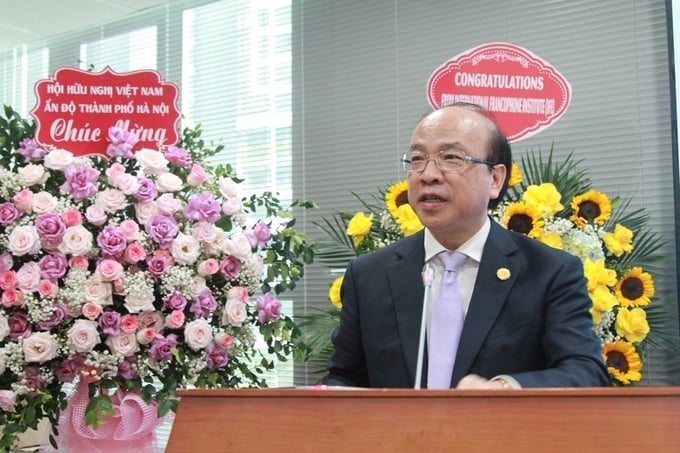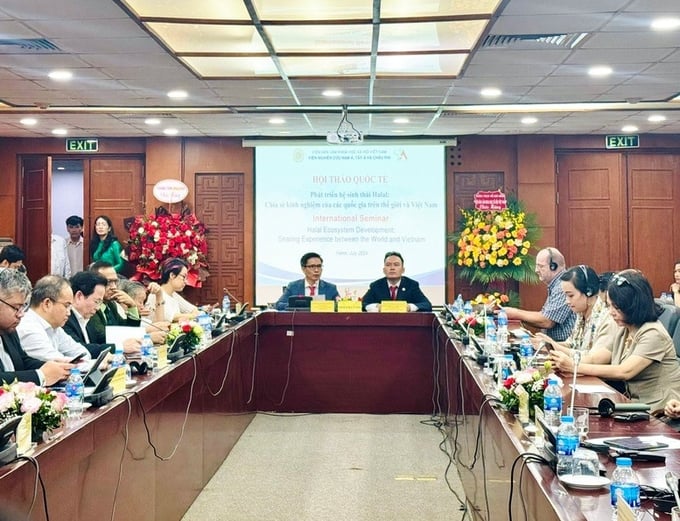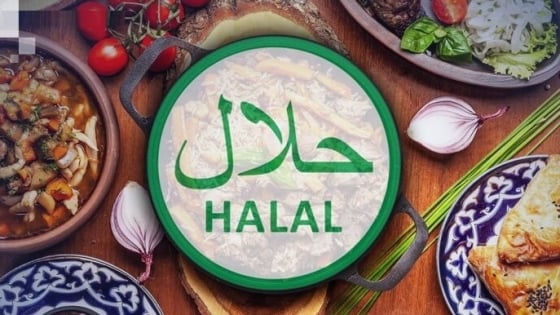(VAN) Despite having many opportunities to develop the Halal industry, Vietnam still lacks a full Halal ecosystem (including production, services, infrastructure, and the State’s support) to develop a sustainable Halal industry.

Dr. Phan Chi Hieu, President of the Vietnam Academy of Social Sciences, spoke at the seminar. Photo: VGP/Hoang Giang.
On July 5, in Hanoi, the Institute for South Asian, West Asian, and African Studies (Vietnam Academy of Social Sciences) organized an international seminar, “Halal Ecosystem Development: Sharing Experience between the World and Vietnam.”
Dr. Phan Chi Hieu, President of the Vietnam Academy of Social Sciences, said that the topic of Halal research is one of the important tasks that the Vietnam Academy of Social Sciences (VASS) assigned to the Institute of South Asian, West Asia, and Africa Studies (ISAWAAS) to implement the Prime Minister’s Project “Strengthening international cooperation to build and develop the Halal industry in Vietnam until 2030.”
Currently, the potential of the Halal market is very large, with a population forecast to reach 2.18 billion people by 2030, accounting for about 30% of the world’s population. And the scale is forecast to reach a maximum of USD 3 trillion by 2025.
Therefore, the seminar has a very practical significance. Specifically, the seminar contributes to the implementation of the Prime Minister’s Project. Create a forum for exchange and discussion on opportunities for Vietnam in opening up exports of goods and attracting investment and Muslim tourists, thereby contributing to promoting cooperation between Vietnam and 57 countries under the Organization of Islamic Cooperation (OIC) and other countries around the world. And evaluate the ability to access the Halal market on a global level to ensure efficiency and sustainability.
Vietnam has many opportunities to develop the Halal industry
At the seminar, sharing research on developing the Halal ecosystem in the world, Dr. Dinh Cong Hoang at ISAWAAS said that Thailand, where Muslims account for 8–12%, is known as the “Halal product processing factory.”
Thailand has built a Halal food industry ecosystem and developed Islamic tourism. As of April 2023, Thailand had 160,000 products, 33,000 brands, and 14,000 companies receiving Halal certificates.
Or in Australia, Muslims account for only 2.4%, but the market has the fastest-growing Halal industry in the world, with an average consumption of more than AUD 13 billion/year serving over 500,000 domestic and international Muslims.
With the slogan of Halal integrity, “From farm to table,” this country leads the world in terms of the ecosystem of processing and producing Halal meat and meat products (beef and lamb are provided for more than 100 countries around the world).
In Australia, domestic and international non-Muslim customers consume Halal products because they meet the criteria for quality and nutritional value. Besides, Muslim tourists are also increasingly coming to Australia.
According to Dr. Dinh Cong Hoang, Vietnam has many opportunities to develop the Halal industry due to its geographical location near the Halal market, and 62% of the population are Muslims in Asia. Aquatic raw materials, vegetables, fruits, rice, coffee, tea, pepper, spices, rubber, cashew, etc. are Vietnam’s advantageous products.
In addition, there are 17 high-quality “new generation” FTAs with markets with strict standards (EU, US, Japan, etc.). This is an important foundation for Vietnam to access the global Halal market.
However, in reality, not many Vietnamese people, including businesses, have knowledge about Halal. The Halal certification process in Vietnam is still complicated and not harmonized internationally.
Furthermore, Vietnamese businesses have to incur high costs when investing in production lines, specialized equipment, and safe raw materials in all stages of Halal’s global supply chain (processing, packaging, transporting, preserving, etc.) and comply with Halal standards.
Additionally, Vietnam still lacks a full Halal ecosystem (including production, services, infrastructure, and the State’s support) to develop a sustainable Halal industry.

Seminar “Halal Ecosystem Development: Sharing Experience between the World and Vietnam.” Photo: VGP/Hoang Giang.
Develop policies for the Halal industry
Proposing some solutions to develop the Halal ecosystem in Vietnam, Dr. Dinh Cong Hoang said that first of all, Vietnam needs to effectively implement the National Project “Strengthening international cooperation to build and develop the Halal industry in Vietnam until 2030”; raise awareness among people, businesses, the Government, and localities in Vietnam about the potential of the Halal market.
At the same time, promote “economic diplomacy” with Muslim countries, research signing FTAs between Vietnam and potential Halal markets, take advantage of regional agreements, etc.
Besides, Vietnam needs to establish a Halal Management Agency in Vietnam (HALCERT), implement Halal standardization, testing, and certification activities for businesses and experts, and sign mutual standard recognition agreements with Muslim countries (Saudi Arabia, Malaysia, Indonesia, Pakistan, etc.).
Establish a Halal supply chain, value chain, and ecosystem; attract both FDI and domestic Halal investment; support and promote Halal production and export activities in priority fields (food, agriculture products, cosmetics, tourism, garments, shoes, etc.); promote digital transformation and e-commerce to export to the Halal market.
Agreeing with this viewpoint, a representative of the Viet Nam Institute of Industrial and Trade Policy and Strategy (Ministry of Industry and Trade) said that Vietnam has export capacity and a food brand in the world’s top 20, but Vietnam is not on the list of 20–30 typical Halal food suppliers globally.
Currently, Vietnam exports only about 20 Halal products, mainly agricultural and fishery products in raw, pre-processed form, which accounts for a small proportion of the total structure of exported products. 41% of Vietnam’s localities do not have Halal-certified export products.
With current opportunities and challenges, the Viet Nam Institute of Industrial and Trade Policy and Strategy proposed two groups of solutions.
On the State side, it is necessary to perfect the legal system to promote the development of Halal products. At the same time, plan to develop Halal industrial parks in provinces with strengths in raw materials, integrating all services related to production, packaging, storage, marketing, appraisal, certification, standardization, circulation, and commercialization of Halal products.
In addition, develop policies to help the Halal industry in Vietnam have sufficient internal forces in terms of finance, technology, and product design competitiveness. Build a national quality standard system and a strict and effective monitoring system for Halal products.
Building a Halal industry development strategy needs to be designed based on high-tech platforms such as blockchain, e-commerce, and automation to manage supply, production, and distribution chains with high traceability to soon access the global Halal market.
On the business side, it is necessary to improve their capacity to meet Halal standards and certification; enhance trade promotion activities; build and promote brands for products and businesses; and focus on investment and technology application in Halal product production. Improve the ability to meet conformity requirements for Halal products and services and accept or recognize the certification results of foreign certification organizations.
Agriculture News | Agri Products Price



